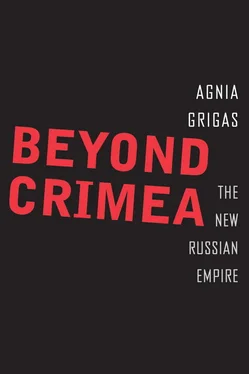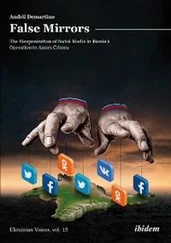Exactly as human rights have increasingly become important in international relations and Russia itself has faced criticism for its domestic human rights record, Moscow has increasingly turned to humanitarian policies as an element of its foreign policy. 32According to the 2009 study The “Humanitarian Dimension” of the Russian Foreign Policy Toward Georgia, Moldova, Ukraine, and the Baltic States, “Russia has chosen an offensive approach to human rights issues as the best form of defense.” 33As a result, Russia has sought out “artificial pseudo-problems” of human rights in the states of its near abroad. 34This counterattack serves several purposes. First, it distracts the attention of the international community from Russia’s own human rights violations. Second, it questions the extent to which states like the Baltics or Ukraine can protect the rights of their minorities, thus challenging the legitimacy of these national governments and seeking to “discredit those countries in eyes of international society.” 35Moscow’s vocal campaign over Russian diaspora rights enables it to internationalize and even legitimize the issue. Finally, Russian foreign policy has embraced the protection of human rights at times when it could not use international law to advance its interests. For instance, the evident weakness of Russia’s arguments under international law regarding Crimea and eastern Ukraine has resulted in Moscow’s decision to defend its actions by broad notions of compatriot protection, legitimacy, justice, and above all national interest. 36
Certainly, since 1991, various minorities in the post-Soviet space, including ethnic Russians and Russian speakers, have faced occasional and in some cases arguably systemic though not explicit discrimination, potential economic hardships, and cultural integration difficulties. However, since the mid-1990s Moscow has packaged the issues of multicultural, transitional societies as “human rights violations,” tying them together with accusations of “fascism” when this suited its foreign policy aims. 37Moscow’s antifascist rhetoric targeting alleged abusers of the Russian compatriots’ rights is even more paradoxical when viewed in light of the fact that Putin regime’s close ties to Europe’s neofascist and extreme right parties are well documented and include floating the French far right National Front with a €9 million loan in 2014. 38But Moscow’s perplexing efforts to “fight fascism” in the former Soviet republics serve a purpose. By seeking to portray its opponents in the Baltic States or in Kiev as “fascists,” the Russian government and its proxies by definition appear “antifascist.” For instance, Putin compared the 2014 conflict between the Ukrainian army and pro-Russian militias in the Ukrainian city of Donetsk with the heroic antifascist struggle of the Russians during the epic two-year siege of Leningrad in the Second World War. 39Paradoxically, in early 2015, the supposedly antifascist pro-Russian leader of the self-proclaimed People’s Republic of Donetsk, Alexander Zakharchenko, declared that Kiev is actually run by “miserable Jews.” 40Rhetoric aside, present-day Russian “antifascism” has nothing to do with genuine antifascism, which is characterized by adherence to democratic principles, respect for international law, and the protection of human rights. 41
To date Russia has sought out existing international organizations and created ones of its own to pursue the issue of violations of human rights of Russian compatriots. Among international organizations, Russia raised and faced the issue of human rights violations in the United Nations, the UN Human Rights Council, the OSCE, the Parliamentary Assembly of the Council of Europe, and the European Court of Human Rights. 42Russia was particularly vocal in denouncing the alleged human rights violations of the Baltic States and also tried to hinder their accession to such international organizations as the Council of Europe and the European Union. 43However, these attempts were largely unsuccessful as various commissions concluded that the three Baltic countries were in fact complying with all human rights standards. 44Possibly the most important Russian organization working on human rights is the Institute for Democracy and Cooperation (IDC), established in 2007 and funded by “private donors” who remain absolutely clandestine. 45Headquartered in New York, this NGO is officially described as a “non-governmental think-tank dedicated to analyzing, defining, and promoting mutual understanding between Russia and the United States.” 46The Institute publishes reports of human rights violations in Western democracies, such as The State of Human Rights in the U.S. (October 2013). Its Paris branch focuses on “the relationship between state sovereignty and human rights,” “interpretation of human rights and the way they are applied in different countries,” and “the way in which historical memory is used in contemporary politics.” 47The organization’s research had a geopolitical tone in 2013, 2014, and 2015 with pieces like “The West’s Post-Modernism and the New Cultural Cold War,” “The Geopolitics of New Multipolarity,” “The United Nations Report Is Neither Realistic Nor Credible” (regarding the UN Human Rights Council’s Commission of Inquiry on Syria), and “Ideology and Geopolitics in Two Cold Wars.” 48In contrast to Russia’s own agenda of criticizing human rights conditions in the United States or the EU, a number of respected, international organizations such as Amnesty International and Human Rights Watch condemn Russia for mistreatment of ethnic minorities within its borders.
Russian humanitarian policies have also taken on military under-tones, especially with Russian peacekeeping operations. Especially in the cases of Georgia and arguably Tajikistan, which are discussed in later chapters, these operations have served as a means for Russia to establish its long-term military presence and create military bases in foreign territories under the pretext of protecting Russian compatriots or other minorities.
In summary, Russian humanitarian policies are a means of increasing Russian influence outside the Russian Federation and are closely tied to Russian soft power, compatriot policies, and propaganda campaigns. However, they have generally but mistakenly been viewed as outside the scope of Russian territorial aims and reimperialization efforts. This road map of the reimperialization trajectory demonstrates how these interconnected, softer policies all lead to Moscow’s efforts for military protection of Russian compatriots and control of the territories where they reside.
STAGE 3: COMPATRIOT POLICIES
While the word “compatriot” generally refers to a fellow countryman or countrywoman, the equivalent Russian word, sootechestvennik , has come to denote the Russian diaspora residing outside the Russian Federation and encompasses ethnic, cultural, linguistic, political, and even spiritual connotations. The term most often refers to ethnic Russians residing in the former states of the Soviet Union, but Moscow has also broadened it by including Russian speakers who may be of various other nationalities such as Ukrainians, Belarusians, Tatars, Abkhazians, Ossetians, and other peoples that were Russified during the Soviet era or even those who are not Russophones but have other cultural, religious, or historical ties to Russia. The origins and evolution of this nebulous “compatriot” category and terminology as well as the development of Russia’s compatriot policies since the 1990s will be examined closely in the following chapter. In addition that chapter will demonstrate how under Putin’s regime the Russian compatriots have been increasingly conceptualized as a potential resource to be employed in foreign policy. Russia has been described as using its compatriots since the 2000s as a “geopolitical entity,” most often with the aim to promote its own national interests rather than those of compatriots. 49Moscow does so irrespective of the laws and preferences of compatriots’ home countries or the compatriots themselves. And while there may be genuine sincerity in Russia’s cultural and nationalist efforts to claim its diaspora, these efforts pale in comparison to Moscow’s manipulation of compatriots as a tool of influence over and territorial aggression against neighboring states. This section will briefly demonstrate how Moscow’s compatriot policies fit with the other items of Russia’s tool kit. Indeed, compatriots are the crux of Moscow’s reimperialization policies in its near abroad. They are the thread that ties together many other means of Russian influence.
Читать дальше












